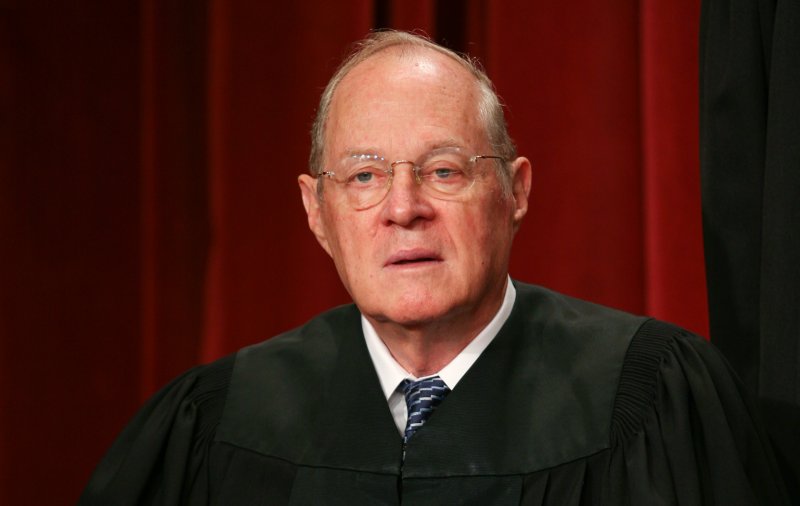Anthony Kennedy is seen after the Supreme Court Justices of the United States posed for their official "family" group photo. UPI/Gary Fabiano/POOL |
License Photo
WASHINGTON, March 21 (UPI) -- The U.S. Supreme Court ruled 5-4 Wednesday in two cases regarding plea bargains and defense lawyers, evoking two strong dissents from Justice Antonin Scalia.
Scalia, joined by his three fellow conservatives, warned that the two decisions would open the floodgates for defendants who pleaded guilty but were dissatisfied with their attorneys' advice.
In the first 5-4 decision, the high court ruled the right to have a lawyer who knows what he or she is doing extends to plea offers that lapse or are rejected.
Writing for the narrow majority formed by four liberals and himself, Justice Anthony Kennedy said the Sixth Amendment's "right to effective counsel" extends to those situations and, citing precedent, to "all 'critical' stages of the criminal proceedings."
Galin Frye was charged in Missouri for driving with a revoked license, but because he had been convicted of the same charge three times before, the violation became a felony with a possible four-year prison term on conviction.
The prosecutor sent Frye's lawyer a letter offering two possible plea bargains, including a chance to plea to a misdemeanor and serve a 90-day sentence. But the lawyer didn't tell Frye about it, and the plea offer expired.
Less than a week before his preliminary hearing on his fourth charge of driving on a revoked license, Frye was arrested again on the same charge. This time he pleaded guilty with no plea bargain and was sentenced to three years.
An appeals court rejected Frye's claim of ineffective assistance of counsel, but the Supreme Court threw out the appeals court ruling and told the lower court to look at the claim in light of the high court opinion.
Also Wednesday, the same Supreme Court majority ruled 5-4 in a Michigan case where a lawyer's ineffective advice led to a plea bargain rejection,
The narrow majority said a defendant can claim a constitutional violation, but in his appeal must show that but for that lawyer's advice, "there is a reasonable probability that the plea offer would have been presented to the court, that the court would have accepted its terms and that the conviction or sentence, or both, under the offer's terms would have been less severe than under the actual judgment and sentence imposed."
The ruling came in the case of Anthony Cooper, who had been charged with intent to murder and three other offenses. The prosecution offered to recommend a 51- to 85-month sentence in exchange for a guilty plea, but his attorney allegedly convinced him to turn it down.
Cooper received a 360-month sentence. He appealed.
Kennedy and his majority threw out a lower-court ruling in Cooper's favor on an ineffective counsel claim, and told the lower court to rehear his case in light of Wednesday's opinion.
In his dissent in the Frye case, Scalia said, "In this case and its companion, the [Supreme] Court's sledge may require the reversal of perfectly valid, eminently just, convictions. A legislature could solve the problems presented by these cases in a much more precise and efficient manner ... by penalizing the attorneys who made such grievous errors. That type of subconstitutional remedy is not available to the court, which is limited to penalizing (almost) everyone else by reversing valid convictions or sentences."
In the Cooper case dissent, Scalia said, "Today's decision upends decades of our cases, violates a federal statute and opens a whole new boutique of constitutional jurisprudence ('plea-bargaining law') without even specifying the remedies the boutique offers. The result in the present case is the undoing of an adjudicatory process that worked exactly as it is supposed to."















